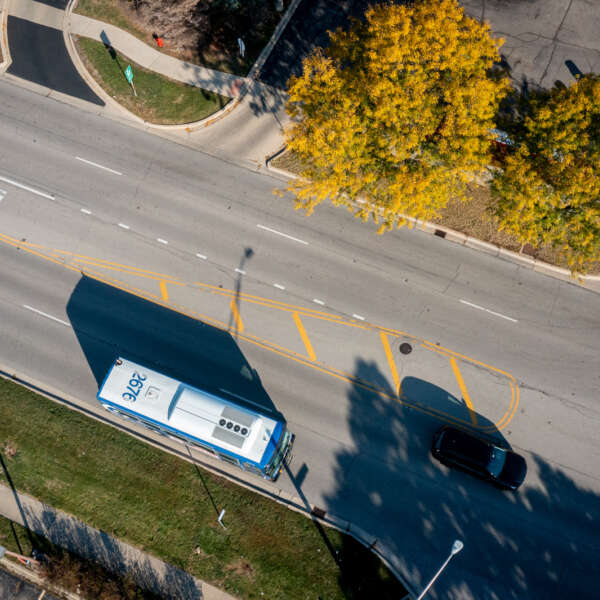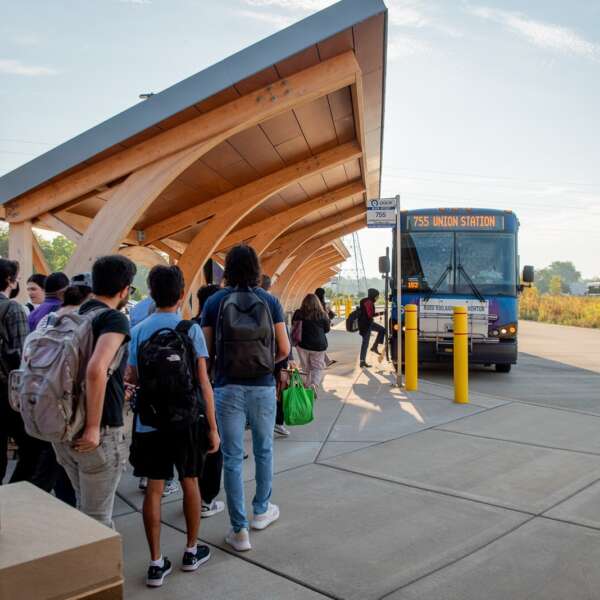Transportation Tuesday recap: A New Era for Chicago Transit: Adapting Service to Address Changing and Unmet Needs of Riders
June 7, 2023
June 7, 2023

The COVID-19 pandemic caused dramatic, lasting shifts in how and when Chicagoans move around the region as well as laying bare inequities in transportation access. A growing portion of residents work from home full-time or work in hybrid environments with occasional trips to the office. Others travel to work or school at locations that lack access to frequent bus or rail service, especially during midday and overnight hours. These realities incentivize transit agencies and local governments to re-think the traditional model that primarily served 9-to-5, Monday through Friday commuters, and test new and innovative ways to deliver transit service to people when and where they need it.
This year’s first webinar of the RTA's four-part Transportation Tuesday Series, moderated by Peter Kersten, RTA Program Manager, Strategic Plan Implementation, featured a panel of representatives from the CTA, Metra, and Pace.
The webinar began with a short introduction reminding viewers that during this time of change, the RTA’s strategic plan Transit is the Answer charts the course for the future of our regional system. A series of presentations from the panelists followed, highlighting the major initiatives proposed by each Service Board to adapt transit service to meet the ever-changing needs of riders.
David Kralik, Director of Planning and Programming at Metra, shared that strategic plan My Metra, Our Future was developed as a result of the pandemic to address new and persistent challenges, such as changes in travel patterns, operating and capital funding needs, and more. Schedules that cater to 9-to-5 travel patterns no longer fit the needs of commuters, thus evolving to “regional rail” service was a key part of each of their strategic goals.
Daniel Miodonski, Senior Manager of Operations Planning and Analysis at Metra, went on to share three new initiatives that will help focus ideas and establish a common service across lines as Metra transitions toward a regional rail system.
The first initiative is an ongoing route restoration study to better understand current travel-demand patterns and incorporate the findings into near term service changes. Building on the results of this study, the second initiative is a systemwide network plan that will set standards with new railcars and infrastructure to better serve new travel markets for the decades to come. Finally, the third initiative is developing an evaluative approach to Transit Oriented Development (TOD) and commuter parking to better respond to the demands of the community.
“Achieving the vision of a regional rail system is a challenge that will take more funding, supportive land use, and cooperation of freight rail partners,” said Kralik.
Pace’s Chief Planning Officer Erik Llewellyn shared that several challenges and changes in ridership demands were brought on since the start of the pandemic. Sixty-five commuter routes connected to Metra were suspended, and while many fixed bus routes were still being used by essential workers; they were most needed in nontraditional hours. As a result, Pace is working on innovating their system through new services and technology such as partnering with transportation network companies Uber and UZURV, expanding their VanGo, On-Demand, and Pulse services, and continuing to partner with TransitApp for their two-year Mobility as a Service (MaaS) pilot project to alert riders, offer seamless trip planning, and more. Pace is also piloting Pace Connect, a service that will connect the CTA Blue Line Rosemont Station to designated O’Hare cargo job sites.
Llewellyn shared that their Network Revitalization and Systemwide Restructuring Initiative will take significant time and effort due to the current limitations on funding and resources. He strongly encouraged everyone to “support public transit and call your local legislators to fund transit going forward.”
Sonali Tandon, Senior Manager for Rail Strategic Planning at CTA, took attendees through an overview of the several Red Line improvement projects, sharing highlights from the Red and Purple Modernization program initiative, and plans and progress for the Red Line Extension.
The Red Line Extension will provide frequent rail service between 95th and 130th streets with four new fully accessible stations and spur equitable transit-oriented development. To support a stronger Chicago region, the Red Line Extension will allow low-income residents to see gains in access to jobs, education, housing, and other economic opportunities throughout the city.
Tandon emphasized that this plan was a community-driven process with public outreach being a “critical component of the work.” The Extension plan comes with several transformational and equitable benefits for the Far South Side and addresses the needs of those in underserved communities.
Transportation Tuesday takes place every Tuesday in June. The webinars are free, but registration is required. Learn more about future events and register to attend here.
Subscribe to our Newsletter
Related Articles
 Coalition members provide feedback on ‘Transforming Transit,’ RTA’s vision for improved service and accountability
Coalition members provide feedback on ‘Transforming Transit,’ RTA’s vision for improved service and accountability
Nearly 200 riders, advocates, and other stakeholders met virtually with the RTA on February 11 for the sixth quarterly Transit is the Answer Coalition meetin...
February 20, 2025 Far South Halsted Corridor Study prepares for future Pace Pulse service
Far South Halsted Corridor Study prepares for future Pace Pulse service
An RTA Community Planning project kicked off in late 2023 as a crucial step in bringing Pace Pulse service to Chicago’s south suburbs. The Far South Halsted ...
February 19, 2025 RTA proposes reforms to prioritize capital projects, maximizing impact of funding
RTA proposes reforms to prioritize capital projects, maximizing impact of funding
RTA is proposing a historic restructuring of the region’s transit governance to maximize the impact of new operating funding and ensure all riders experience...
February 5, 2025 RTA proposes reforms to integrate fares, require accountability for faster and more reliable transit
RTA proposes reforms to integrate fares, require accountability for faster and more reliable transit
RTA is proposing a historic restructuring of the region’s transit governance to maximize the impact of any new operating funding and ensure all riders experi...
February 5, 2025 For the third year in a row, regional transit ridership was up by double-digits in 2024
For the third year in a row, regional transit ridership was up by double-digits in 2024
Ridership across the Chicago region’s transit system continued to increase throughout 2024, according to the latest data from CTA, Metra, and Pace. The regio...
January 28, 2025 RTA is seeking $1.5 billion in annual operating funding. What would that mean for your commute?
RTA is seeking $1.5 billion in annual operating funding. What would that mean for your commute?
On January 15, RTA released Transforming Transit, a vision for the regional transit system with $1.5 billion in annual operating funding supported by a stron...
January 28, 2025